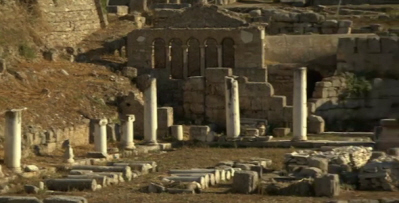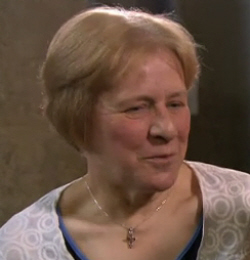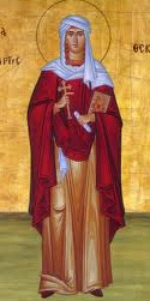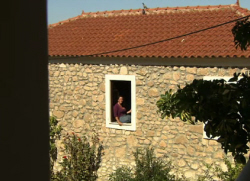Thecla
Disciple Paul - Corinth
There has long been an underlying assumption that to be a true representative of the Christian God, you really need to be a
man. In the Church of England and across the world, the issue of whether women should be bishops has caused turmoil, and most
Catholics believe that women shouldn't even be priests.
Amongst them is Catholic writer and broadcaster Joanna Bogle.
Joanna "God became incarnate as a man. That's not an accident. Christ was born and grew up in the world where every religion
had priestesses. He knew what he was doing. He is Almighty God. This was the plan from the beginning, that men would be priests.
Priests are there to serve the church, but it's not a question of allowing women to be priests. It's in the nature of woman that
she has another task to do."

Corinth
So God loves you. He just doesn't want you to give the sacred Eucharist?
Joanna "I could if I need to distribute holy Communion, but no. A priest in the person of Christ, who was male, will preside
seeing 'This is my body'. And I think that's a very profound."

Joanna Bogle
So you think for the future of the church, it's entirely appropriate that there are no female priests, there are no female bishops?
Joanna "it's not that they MAY not, we CANNOT have them. That's a bit like saying, 'What a pity men can't give birth'. There are not
going to be, there cannot be women priests. It's not in the nature of womanhood. That's the deal."
I have to admit that I find Joanna's position hard to accept. But she reflects the views of no lesser an authority than the
Pope himself. In 2010, the Vatican declared that to ordain a woman was a serious crime. Now that seems to me to be very
shocking, but, also as a historian, it's just rather odd, because if you investigate the foundations of Christianity, they tell
a very different story.
I'm going to travel back to those crucial first few centuries. To the time when this new faith was merely a splinter group
from the existing religion of Judaism.

Thecla
The new movement, the Christ cult, had a vigourous champion, the convert, Paul. It was Paul who took this fledgeling Jewish
movement and opened it up to non-Jews. He made it his mission to spread the new faith right across the Roman Empire and, as he
did so, he carried with them one particular message that had a huge impact in its time, but is often underplayed or forgotten today.
I'm heading to one of the places where this message was first declared. The ancient Greek city of Corinth once had a bustling
port and was one of the main hubs of the Roman Empire. It was to the people of Corinth that Paul directed his most famous
teachings - that would become crucial passages in the new Testament.
His first letter to the Corinthians contained some troubling lines. "What I mean, brothers and sisters, is that time is short. For this
world in its present form is passing away." Paul's message was stark and unforgettable. What he was saying was that soon, the world was
going to end.
The early followers of Christ were told that they were living in the end of days. And so for them, earthly matters were no longer a
concern. What this meant for women was nothing short of remarkable.

Transfixed
There is an early Christian text that you won't find anywhere in the Bible, but it is a vital bit of historical evidence.
It's called the acts of Paul and Thecla. Scholars believe this text was written in the second century AD Later church leaders
decided that the contents of this Christian narrative were not suitable for the Bible.
It describes how one day in the first century AD Paul was preaching to a group of people in a town called Iconium, in what
is now modern-day Turkey. The key character of our story wasn't allowed out onto the streets, so we find her eavesdropping at
the window of a nearby house. She was a young girl, only around 13 or so, and her name was Thecla.

Thecla's Window Seat
Thecla was betrothed to a man called Thamyris, but she was about to do something radical. Thecla, listened intently while Paul
dropped his bombshell. "Forget the traditions of the past." He said. "Give up your ideas of marriage and children, because the
end is nigh." For three days and nights, she sat transfixed at her window, absorbing everything she heard. And then she committed
the ultimate act of rebellion.
She hurried through the house to break the news to her mother. She wasn't going to marry, instead she was going to stay a virgin.
She would leave home and follow Paul and his incendiary words. Thecla's mother was, of course, horrified. This broke with centuries,
if not millennia, of tradition.
And you can gauge the scale of her outrage from her reaction. We are told that she cried out, "Ban
the lawless one! Burn her that is no bride, so that all the women who have been taught by this man may be afraid." Thecla
ran. She hit the road with Paul. With her hair cut short and wearing boys clothes, she travelled with them everywhere.
She abandoned everything she'd known for this new religion.
What can the acts of Paul and Thecla tell us about the role of women at the beginning of Christianity?




